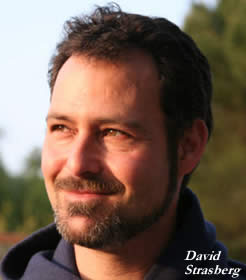 David Lee Strasberg serves as Creative Director and Chief Executive Officer of the Lee Strasberg Institute in Los Angeles and New York. The world famous Institute was founded by Lee and Anna Strasberg in 1969 and serves as an international center for training method actors. The Institute also features the new Lee Strasberg Digital Film School that nurtures the personal visions and skills of new directors.
David Lee Strasberg serves as Creative Director and Chief Executive Officer of the Lee Strasberg Institute in Los Angeles and New York. The world famous Institute was founded by Lee and Anna Strasberg in 1969 and serves as an international center for training method actors. The Institute also features the new Lee Strasberg Digital Film School that nurtures the personal visions and skills of new directors.
Strasberg has produced short films and dozens of plays with The Group at Strasberg, an in-house production company based at the not-for-profit Lee Strasberg Creative Center in Los Angeles. Before taking the reigns of the Lee Strasberg Institute, Strasberg served under Los Angeles Mayor Richard Riordan where he was a member of the Economic Development team rebuilding Los Angeles and attracting new businesses after the 1994 Northridge earthquake. Among other responsibilities, he served as Senior Policy and Budget Analyst overseeing the L.A. Fire Department, Information Technology Agency and Cultural Affairs Department.
Strasberg was born and raised in New York City, has a Masters in Business Administration from the UCLA Anderson School of Management and Bachelor of Art degrees from Brown University. He is married to entertainment attorney Lindsey Strasberg who is a partner at the Beverly Hills law firm of Sloan, Offer, Weber, Dern, and he is the father of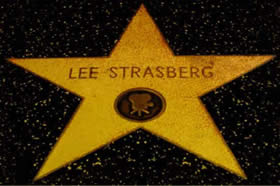 Gwendolyn, Scarlett and Sawyer.
Gwendolyn, Scarlett and Sawyer.
Cinema Without Borders: Please tell us briefly about the school’s international influence and Method Acting technique.
David Strasberg: The roots of American-born method acting actually are from Russia but the style has always been considered a very American approach and that acting style, if you will, that acting approach has been linked 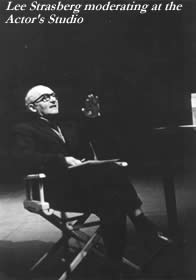 to a whole lineage of American Actors for the last 70 years: the great icons in American cinema from Dean and Brando and Monroe — You know this whole sort of line of people that we think of as American actors. Interestingly, during this whole time, the interest in how these results were achieved and how these actors found themselves, you know –used their talent to get these results– has caused an incredible respect in the international community. We have students coming to us from all over the world; From Europe, Asia and Latin America. They are all following the same dream of every actor and every director: they want to make films, they want to be in films, and they want to find their unique voice and that’s what we do. We help that actor not just find our style, but to use our approach to find their own style. To find their own unique voice and they can take that and bring that back to their country and use their own experience, their own life, their own heritage, to create their work.
to a whole lineage of American Actors for the last 70 years: the great icons in American cinema from Dean and Brando and Monroe — You know this whole sort of line of people that we think of as American actors. Interestingly, during this whole time, the interest in how these results were achieved and how these actors found themselves, you know –used their talent to get these results– has caused an incredible respect in the international community. We have students coming to us from all over the world; From Europe, Asia and Latin America. They are all following the same dream of every actor and every director: they want to make films, they want to be in films, and they want to find their unique voice and that’s what we do. We help that actor not just find our style, but to use our approach to find their own style. To find their own unique voice and they can take that and bring that back to their country and use their own experience, their own life, their own heritage, to create their work.
CWB: Before going deeper into the question about what method acting can do for cinema today, please tell us about great names associated with the Lee Strasberg Theater Institute.
David: We are blessed with a history full of talented people and that began in the 30’s with stars like the John Garfields of the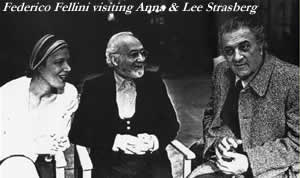 world. But when people think of Strasberg and people think of the method, it really is the James Dean, the Marylyn Monroe, and even the Marlon Brando era method actors – that’s sort of the roots. And then they gave way to people like Paul Newman, Al Pacino, Dustin Hoffman, and Sally Field.
world. But when people think of Strasberg and people think of the method, it really is the James Dean, the Marylyn Monroe, and even the Marlon Brando era method actors – that’s sort of the roots. And then they gave way to people like Paul Newman, Al Pacino, Dustin Hoffman, and Sally Field.
CWB: And Jack Nicholson and Jane Fonda…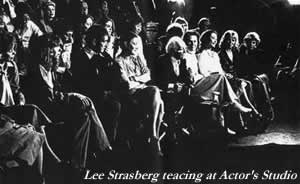 David: Jack Nicholson, certainly. Jane Fonda. Just about anyone in either of the Godfather movies; Just a phenomenal group of actors. But what is remarkable is that today there is a whole new generation of people that have come out. Angelina Jolie and Scarlet Johansen and Uma Thurman who trained with us, Alec Baldwin and John Leguizamo. A whole new group of actors. Even Matt Dillon who trained with us you know, as a kid, is now a star and his career is rising again. A new group of people who are on television and obviously in the big films and I have to say that we are reluctant to boast about things. These are all people who say they have studied with us and
David: Jack Nicholson, certainly. Jane Fonda. Just about anyone in either of the Godfather movies; Just a phenomenal group of actors. But what is remarkable is that today there is a whole new generation of people that have come out. Angelina Jolie and Scarlet Johansen and Uma Thurman who trained with us, Alec Baldwin and John Leguizamo. A whole new group of actors. Even Matt Dillon who trained with us you know, as a kid, is now a star and his career is rising again. A new group of people who are on television and obviously in the big films and I have to say that we are reluctant to boast about things. These are all people who say they have studied with us and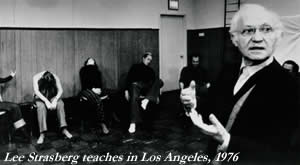 what’s important is that our work is not based in theory so you look to who has studied with us in the past only to know, what we can expect in the future. We are continuing to help people to do their best work as actors and to give their best performances that are what I’m most proud of. Not only that our name is still recognized around the world, but that our actors are recognized around the world.
what’s important is that our work is not based in theory so you look to who has studied with us in the past only to know, what we can expect in the future. We are continuing to help people to do their best work as actors and to give their best performances that are what I’m most proud of. Not only that our name is still recognized around the world, but that our actors are recognized around the world. 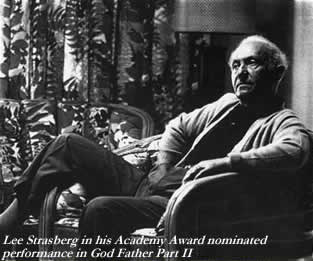 CWB: Main stream Hollywood continues making “Hollywood Style” movies, but international cinema has moved more towards realism. How could method acting help directors –and filmmaking– in other countries?
CWB: Main stream Hollywood continues making “Hollywood Style” movies, but international cinema has moved more towards realism. How could method acting help directors –and filmmaking– in other countries?
David: To tell any story—from a fantastic, surreal story to a very naturalistic, realistic story—the key ingredient is always humanity; It’s human experience. Whether you’re going to a museum to see art or you go to the theater to see a film. Human experience is somehow translated and shown to us. That human ingredient is the one thing that only the actor can bring. So, regardless of the style of your piece, humanity needs to be presented there. Once you have that human experience in it, which is what we train our actors to bring, then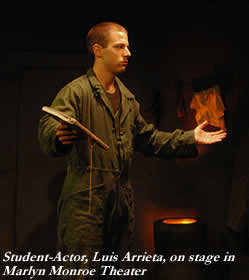 you can put it into any style. But it has the fuel to power whatever vehicle you create for. We don’t want people just to be natural or just casual; we want people to be true to their reality. We want them to be able to create their own reality —even if it is a fantastic reality— and then live that out truthfully. That gives you a lot of flexibility in your style but it retains its essential power of the human being that the actor brings.
you can put it into any style. But it has the fuel to power whatever vehicle you create for. We don’t want people just to be natural or just casual; we want people to be true to their reality. We want them to be able to create their own reality —even if it is a fantastic reality— and then live that out truthfully. That gives you a lot of flexibility in your style but it retains its essential power of the human being that the actor brings.
CWB: There are many film directors now that instead of working with professional actors they use ordinary people. Can Method Acting help them?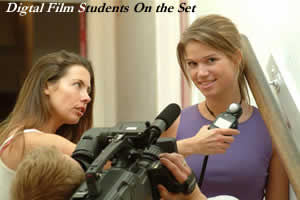 David: Directors are always searching for spontaneity. They are searching for that spontaneous, unique behavior and actors that haven’t been well trained oftentimes give them conventional work. So I think directors have been looking to untrained actors because they want to find something fresh, something unspoiled by the façade. Every person who steps in front of a camera engages some sort of reluctance as they start to judge themselves. The actor’s own fear from being watched or worrying about if they are doing right thing is another issue. What directors need to find is how to watch an actor and how to look for what they need. One actor needs a pat on the back, the other needs a shout, and the other needs a whisper in the ear. Understanding the actor gives a huge advantage to any director. If you’re working with untrained people I think it it’s doubly important because you can’t fall back on the standard vocabulary that you use to guide a professional actor. You really have to understand what you want and what that actor needs at that moment. And that takes experience and training and that takes time. The more time you spend with actors, the better you can master your own vocabulary and your own way to unlock the code for that actor.
David: Directors are always searching for spontaneity. They are searching for that spontaneous, unique behavior and actors that haven’t been well trained oftentimes give them conventional work. So I think directors have been looking to untrained actors because they want to find something fresh, something unspoiled by the façade. Every person who steps in front of a camera engages some sort of reluctance as they start to judge themselves. The actor’s own fear from being watched or worrying about if they are doing right thing is another issue. What directors need to find is how to watch an actor and how to look for what they need. One actor needs a pat on the back, the other needs a shout, and the other needs a whisper in the ear. Understanding the actor gives a huge advantage to any director. If you’re working with untrained people I think it it’s doubly important because you can’t fall back on the standard vocabulary that you use to guide a professional actor. You really have to understand what you want and what that actor needs at that moment. And that takes experience and training and that takes time. The more time you spend with actors, the better you can master your own vocabulary and your own way to unlock the code for that actor.
I think understanding how to work with an actor is just understanding how to work with another human being; It has the same challenge. It’s harder to work with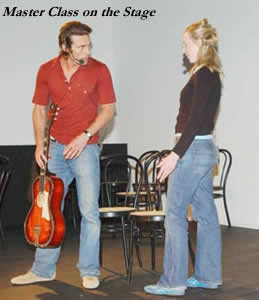 someone that’s untrained only because you can’t use a standard vocabulary that you both share. But the art of watching that human being and helping that human being find something special and find something truthful is what you need to have.
someone that’s untrained only because you can’t use a standard vocabulary that you both share. But the art of watching that human being and helping that human being find something special and find something truthful is what you need to have.
CWB: Is it true that Method Acting helps the actors to use their own life experiences to act better?
David: Each actor has his or her own reservoir of experiences. To someone, especially a younger person, the loss of a pet can be significant enough to play a character with another kind of loss. But it doesn’t always have to be literal. You can be very creative in the use of your experience and your imagination for that matter. You can make situations and then believe them with the force of will to make them real to you. What I think is a problem for many directors or actors trying to use these skills is that they think: “Oh, I must create exactly what the script is saying just happened.”
But actually you can discover your story as an actor with the help of your director. You can find a way to create something that maybe no one thought of before. But if it works and if it’s true to that actor, it also usually works in the scene that it’s needed for.
CWB: Please tell us about your international seminars.
David: Internationally, we have certainly done seminars that have been very, very successful, particularly through Europe but also in Latin America. We go to talented actors who have some training but haven’t reached the depth of training that they could get at a place like our institute. We can go there and help those actors by sort of opening a new door for them and giving them a view as to what the next step might be for them. With directors, we have run directing seminars here in the states but we have never done directing seminars abroad. I think that there is a real opportunity for international directors who, by the way, come to us at times. We have had Cuban directors come to us for their training. Directors are mastering so many new tools and they are digitizing and they are using green screens and they are using a lot of these fantastic technological tools to tell stories effectively. They go through this whole process of being very, very detailed and very precise in, for example, their animation work, or in their special effects work and I think at times they become frustrated when they reengage the actor and the actor is not as predictable as a machine or as a computer. So tension develops and the next challenge for a lot of directors is how they match their technical skill and ability, not just to interact with the computer and their editing crew, but also with the human component of their film. That’s the component that audience is going to identify with. All the rest is fantastic support work; fantastic structural work to support that actor’s performance and that human being’s journey in your story—whatever that story is.
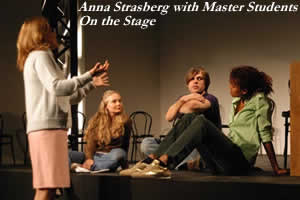 CWB: What would be the duration of a seminar considering that your team of trainers would have to travel to the location?
CWB: What would be the duration of a seminar considering that your team of trainers would have to travel to the location?
David: I think a seminar for directors would be about 3 days to give people enough time together to work with actors and start to actually use the skills we are talking about and to begin to try to experiment with them. Then directors have to use those skills and every one is going to use them a little differently. So if you can spend 3 to 4 days, that would be enough to at least open the window into a new area for these directors so they can continue to find more by exploring in their own work.
CWB: Is it possible to plan the seminar as an event in an international film or theater festival? This would help to build user groups of method acting among filmmakers.
David: Doing a seminar at a festival would be a great idea because one of the things you could build is continuity: a year-to-year continuity—because that really is the cornerstone of craft. Building skill requires continuity and the more you can go back and refresh that understanding, the better. Every year you will be learning something different and you will stand on the knowledge that you learned the year before. You can go a step further and bring your own experience and share it with others. That’s a huge advantage to be able to do that as opposed to just doing it one time where you get a glimpse but now you’re on your own to pursue that future that you see in front of you.
CWB: How can film directors or students who want to come for acting courses attend the Lee Strasberg Theater Institute?
David: We accept international students from all over the world. Students need to apply to us. They submit materials including a short essay, a headshot, résumé,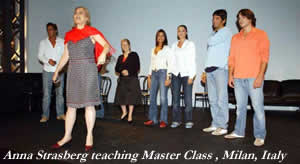 etc. Based on that, we judge the application and they have the opportunity to come study with us if they are accepted. It is best if that person could actually come in and visit us in New York or Los Angeles in advance as a tourist. They can come in and set up an appointment to meet us and talk to us and ask questions and we get a chance to get to know them. To begin with, they should contact us through our website at www.strasberg.com. That’s the cleanest way to begin a conversation with us. We can walk through all the steps that they need to go through and really the most difficult part is their own commitment. They need to make a commitment to come away from home to fantastic cities, to come to New York or Los Angeles, and be willing put the time in to make it worth their while because it’s a great opportunity for people both to come and potentially work in Los Angeles or New York City but also to come and learn and take that experience back home with them. To be a filmmaker in Germany or in France or in Italy and to do your work there you don’t have to live in Los Angeles the rest of your life. You can learn your craft here and go back and use people you know at home and use material that you can develop in your own language and I think that’s very valuable for people to understand that option and know that you don’t have to become a star in Los Angeles in order to make the journey worthwhile. It’s a great opportunity for people to come and get access to a kind of training that just isn’t widely available outside of New York and Los Angeles.
etc. Based on that, we judge the application and they have the opportunity to come study with us if they are accepted. It is best if that person could actually come in and visit us in New York or Los Angeles in advance as a tourist. They can come in and set up an appointment to meet us and talk to us and ask questions and we get a chance to get to know them. To begin with, they should contact us through our website at www.strasberg.com. That’s the cleanest way to begin a conversation with us. We can walk through all the steps that they need to go through and really the most difficult part is their own commitment. They need to make a commitment to come away from home to fantastic cities, to come to New York or Los Angeles, and be willing put the time in to make it worth their while because it’s a great opportunity for people both to come and potentially work in Los Angeles or New York City but also to come and learn and take that experience back home with them. To be a filmmaker in Germany or in France or in Italy and to do your work there you don’t have to live in Los Angeles the rest of your life. You can learn your craft here and go back and use people you know at home and use material that you can develop in your own language and I think that’s very valuable for people to understand that option and know that you don’t have to become a star in Los Angeles in order to make the journey worthwhile. It’s a great opportunity for people to come and get access to a kind of training that just isn’t widely available outside of New York and Los Angeles.

